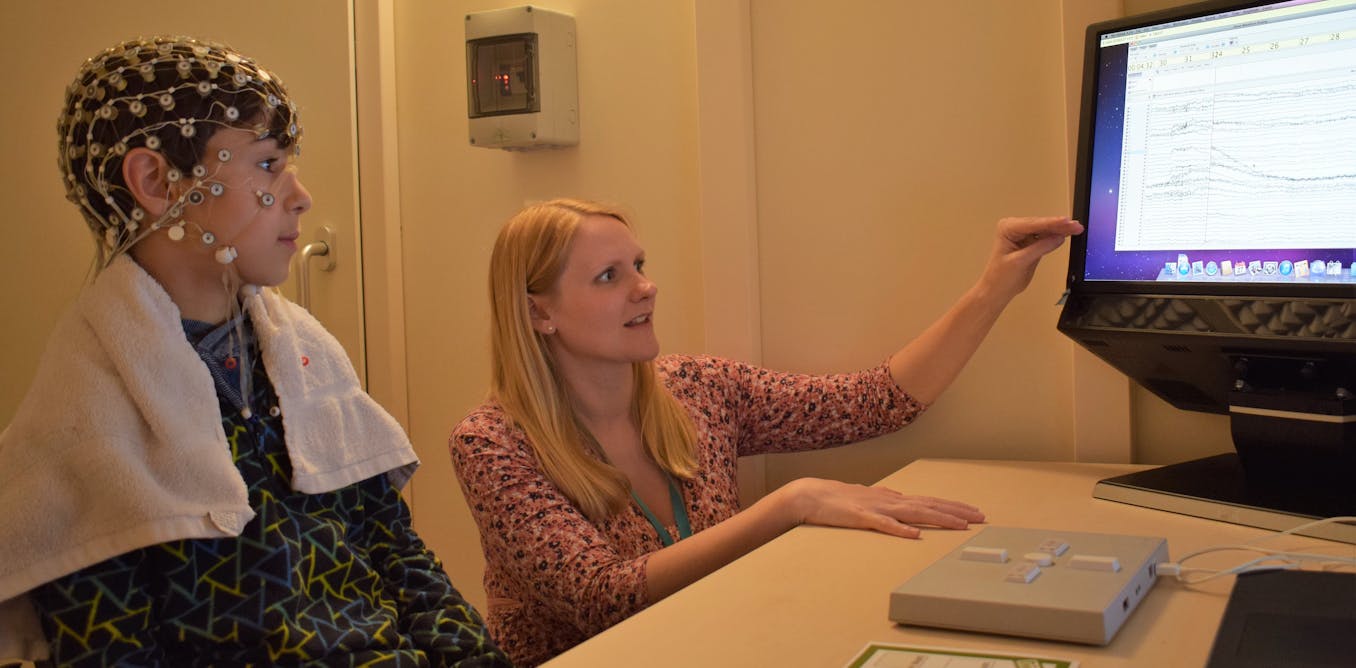How moving dots are helping us learn more about dyslexia in children: new research
Children with dyslexia seem to find it more difficult to judge the direction of moving dots - this could explain why reading is also more challenging.

Around one in ten children in the UK have dyslexia, a developmental condition which means that they struggle to learn to read. It often causes difficulties in spelling too.
Reading and spelling involve mapping what we see on a page to correspond to spoken language and meaning. So, reading difficulties could at least in part be caused by differences in how the brain processes visual information (how the brain makes sense of what we see).
Read more: Teachers don't understand the depth of dyslexia
One visual skill that has been found to differ between people with and without dyslexia time and time again is the ability to perceive motion, which essentially means how we work out the direction of moving objects.
In a display of dots moving in different directions, people with dyslexia tend to need more dots to be moving in the same direction in order to accurately judge the overall direction. But until now, we have not really understood why this ability is affected. We wanted to try to find out, to get a better understanding of how the brain develops differently in children with dyslexia.
How children with dyslexia perceive motion
One possibility is that a pathway in the brain that is required for perceiving motion develops differently. This pathway is specialised for processing information that changes rapidly over time, such as moving objects which change in location over time, or speech sounds, which change in frequency over time. That is how we distinguish one sound from another.
There are many processing stages involved in making a judgement about the direction of a moving object. Not only do we have to first encode the visual information, by seeing the object. We then have to gather enough evidence about which way it is moving so that we can make a decision about it, before we can then respond. That might be moving towards a ball to catch it, for example.
So far, it hasn’t been clear where the differences lie in people with dyslexia. In our recent study, we wanted to find out whether it is the early sensory encoding or the decision-making stages, or both, which are affected.
Children were presented with patterns of moving dots in child-friendly games and asked to work out their overall direction across two tasks. They had to press a button to say whether they were going “left” or “right”. We also measured children’s brain activity using an EEG cap on their heads.
Then we analysed how accurate children were, and how long they took to make their responses, using a mathematical model. The results of this model showed that children with dyslexia were slower to gather evidence, and decide on the direction of the dots, compared to the children without dyslexia.
While an earlier study reached a similar conclusion, we were also able to link this behavioural difference in dyslexia to differences in their brain activity measured using EEG.
When making decisions on the direction of dot movement, children showed a gradual ramping up of brain activity measured by sensors positioned at the centre of their heads. Importantly, this ramping up was more gradual in children with dyslexia, which corresponded to the slower rate at which they gathered evidence in our mathematical model.
We also analysed the early EEG responses to visual motion, from when the children first saw the moving dots. This suggested that early sensory processing – the initial seeing of the moving dots – is similar in all the children who took part in the study.
Taken together, our findings show that children with and without dyslexia do not seem to differ in how they initially process visual information, but instead in how they make decisions about it. They seemed to see the moving dots just as easily, but took longer to decide in which direction they were moving.
Possible effect on reading ability
Although words are motionless, differences in these motion tasks could influence children’s ability to read. That’s because the sounds that make up language change quickly over time – just like a moving dot – so rely on the brain processes that can detect these changes well. The ability to process the rapidly changing sounds that make up a language are involved in phonological processing, which has been extensively linked to dyslexia and basically means using the sounds that make up a language to process spoken and written language.
Read more: A brief history of dyslexia and the role women played in getting it recognised
If children with dyslexia are slower to make decisions about the direction of movement, they may also find it more difficult to differentiate between sounds in the spoken word. In turn, this could make reading more difficult as it is so dependent on spoken language and meaning.
We now want to find out whether children with dyslexia are slower to make decisions for other types of information which we collect through our senses, or whether the differences just relate to visual motion.
Another area of interest, is whether other skills – such as general processing speed and cognitive ability – are related to both the decision-making and reading difficulties.
These studies are helping us to build a better picture of how the brain develops differently in children with dyslexia. Our findings demonstrate that dyslexia could affect more than just a child’s reading and spelling abilities. It is important that we all bear this in mind when supporting children with dyslexia.![]()
Catherine Manning receives funding from the Wellcome Trust.
Gaia Scerif receives funding from the Nuffield Foundation and the British Academy. Gaia is a Trustee of the Fragile X Society.
What's Your Reaction?






























































































